Vinphonic
10-03-2017, 03:28 PM
The Legacy of Japanese Composer
Taku Iwasaki
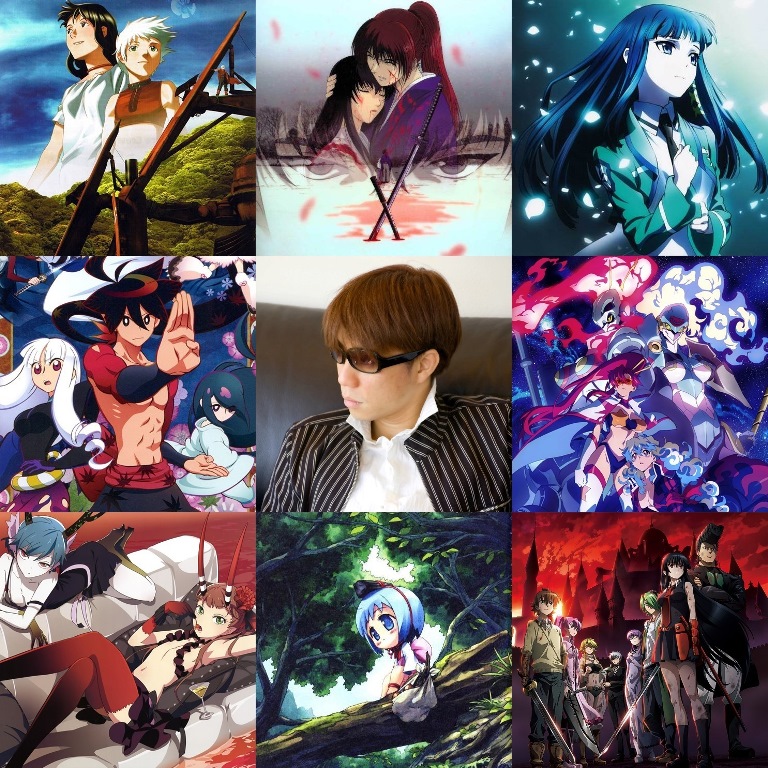
Taku Iwasaki is after Tanaka the second most prominent „Anime Composer”, perhaps to even more extremes than the original. His career has pretty much been anime-only and it seems to stay that way for years to come. He started as a song arranger for anime and now has become a distinctive and revered voice in the anime scoring world and is one of the few old warriors left (he’s almost 50 now), waving the flag for opera and Broadway song in media scoring. His music is as diverse as music can be. You get everything from 1920s galore and Italian opera to Zimmerian action and electronic dubstep. But if there's an area where he is pretty much the king of media composers now, it's in the romantic impressionism departement. His genius comes in the form of a mask with two faces: “The Composer” and “The Artist”. During the last decade he did mostly wear the mask of the artist while his earlier years were pretty much that of a traditional media composer. But recently he lets his old self emerge from time-to-time. “The Composer” can be divided into two phases: One more classically oriented and one on the side of Zimmer and RC. Iwasaki appears more confident and sincere in his talent for orchestral writing in the classical phase, often paying homage to the classical repertoire and the Golden Age of Hollywood. But Iwasaki is also very much a fan of Zimmer (mostly his early stuff). What I find ironic is that while Iwasaki pays homage to the style, he also puts the original inspiration to shame. It all comes down to the simple fact that Iwasaki lives and breathes with a classical mind (grounded on classical education) and Zimmer does not or at least never demonstrates it. I divided his “Artist” side by two Phases: The first one I call Rapera, his most recent one Dubera. It’s born out of his adoration for Rap, Dubstep and Opera. What characterizes both is at least one standout cue in every album, mostly an operatic piece or orchestral song among much electronics, rap or dubstep. In some cases the orchestral score is even build around this one piece, like Jojo with L’anima or Qualidea Code with Canary. Lets just say he wrote some true gems as Iwasaki “the artist”.
The Composer
I. The Classical Phase

Agito was the only time in his career working with a worldclass symphony orchestra and I would say he succeeded with flying colors in adapting his orchestral style for a symphonic ensemble. Some additional parts are done by a studio ensemble.
With Binchou-tan he again demonstrated the same kind of ingenuity with a chamber ensemble, delivering a unique and incredible heartwarming score. It’s as soothing as it is jolly with moments straight out of a ballet or romantic symphony.
In Black Butler Iwasaki lets his inner maestro loose, delivering hours of opera, marches, waltz, requiem and concerto. All in a quite sinister tone that would fit a Tim Burton movie like a glove.
Despite of having a bit Zimmerian action there’s A LOT of Herrmannesque beauty in Kataganagatri, a rather substantial amount of score with a nine minute concert piece and perhaps his most awesome song, “Peacock blue eyes”. A worthy successor of Kenshin with some unique instrumentation choices like Wood/Templeblocks. His “Gettouka” triumphs over similar efforts, like Kawai’s Ghost in the Shell for example.
Akame ga Kill is a modern action score done right, with unique use of epic choir and e-guitar. The action is definitely inspired by Dark Knight Rises. There’s a genius moment in “Formidable Enemy” that starts like a modern Blockbuster track but at the end evolves into a majestic SciFi moment. In the later half we have some absolutely sublime moments with some of the best orchestral pieces of Iwasaki’s career. I must also give him credit for actually getting me a little teary with ethnic vocals.
As of now there’s not much to justify Stray Dogs in this category BUT I put it on there in knowledge of things to come.
II. The Zimmerian Phase
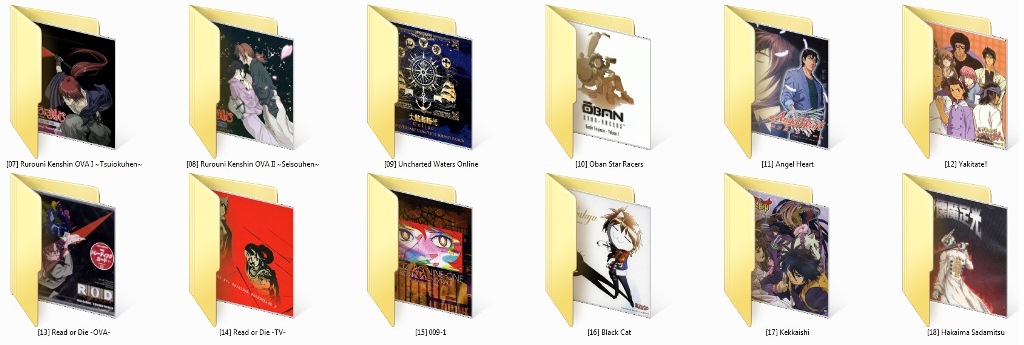
His first major debut was with Rurouni Kenshin, and to this day one of his best works I would argue. It has beautiful romantic melodies crossed with early Zimmer style and a remarkable tragic tone. The second OVA in particular nails the tragic beauty aspect perfectly, with “Heart of the Sunrise” being one of my favorite Iwasaki pieces.
Uncharted Waters: Online is a potpourri of various musical styles and instruments. Iwasaki certainly nails the “period and place impressions” and gives us a hint just how good a traditional adventure score from him would sound like with “Battle Offense” and “Event: Delight”.
Oban Star Racers is basically a more refined Zimmer action score with some sublime Silver Age Hollywood moments. A terrible shame the unreleased music of the show will never see the light of day.
One of his most beautiful scores from this phase is Angel Heart, a beautiful noir score with Zimmerian action, but more importantly, dreamy sax pieces like they don’t make them no more and incredible romantic interplay of strings and piano.
Yakitate!! Japan is yet another potpourri, you have Backdraft and famous Band work from the 80s mixed with Golden Twenties galore and romantic symphony. Iwasaki is again showing his immense range and talent and even giving us a full-fleshed concert piece with “Japan, the World I create”.
We go into the glorious 60s spy movie territory with Read or Die. It’s basically what would happen if Zimmer and Serra scored 60s Bond and then some. The TV version is of course the main course, full of delicious Jazz and synthesizers galore. 009-1 is pretty much an encore of R.O.D and very much in the same vain.
Black Cat marked the beginning of his upcoming operatic trademark and orchestral song and very much functions as a transitional work were he slowly switched sides. Kekkaishi is another transitional work, but much more traditional. Many of his upcoming trademarks appear like the filtered trumpet, temple blocks and vocal effects. Bu there’s still a substantial amount of beautiful strings and woods.
Hakaima Sadamitsu is a much earlier work and perhaps his most unique one, going full spaghetti western. It will not be the last time he evokes Morricone.
The Artist
III. The Rapera Phase

Starting with his famous artist debut: Tengen Toppa Gurren Lagann. The usual romantic and jazzy Iwasaki is there, but we also have a pretty rap and electronic focus aspect. The action is no longer 100% Zimmerian and slowly becoming its own thing. It also has much stronger thematic consistency than usual, not to mention his first pioneer work in mixing orchestra & opera with rap.
Soul Eater continues the trend with a healthy dose experimental electronics and a little rap, but at its core has wonderful string and piano pieces, an insanely cute Disney song and a full-fleshed opera piece.
Persona: Trinity Soul is very much in the same territory with opera and rap, but has many callbacks to his earlier works like Angel Heart and beautiful song and piano tracks. Unfortunately not every track is real, a chunk of it is synth.
For C I prepared a special package: I divided the meat of JoJo and Jormungand to “C”, since I believe Iwasaki has some sort of continuity between these three scores, at least judging by the track titles and tone, while the dubstep and electronic orchestral pieces went to Gatchaman (I find it a perfect fit). C (The compilation) is not only a conglomeration but also culmination of Iwasaki’s current style. Beautiful orchestral song straight out of 1920 pared with modern RC action, various flavors of Jazz, impressionist concert work and glorious Italian Opera.
Noragami Aragoto is basically an arthouse score for some experimental film with some great string action, much more traditional than usual. A beautiful piano and flute piece is followed by a mini-concerto for flute before drifting into Hitchcock territory with one of the most incredible pieces of Iwasaki’s career.
God’s Notebook (Kamisama no Memou-choui) has electronics but is quite quaint compared to later works and much more gentle with beautiful song, some incredible noir pieces and the usual dose of romantic strings and piano. A beautiful breeze of fresh-air before the rather heavy albums are about to hit your ears.
IV. The Dubera Phase

Mahoka (The irregular at Magic High school) is more focused on the electronics with some experimental wackiness. Nonetheless this is Iwasaki we’re talking about so even the RC action has meat under it and switches from dubstep to a Holst-like rhythm in a matter of seconds. Speaking of Holst, an electronic dance track starting with a Jupiter-esque intro… oh Iwasaki-san. For the traditionalist there’s of course beautiful song, romantic piano and strings and the best variation of a “The End” moment Iwasaki has written.
The heart of QUALIDEA CODE is the beautiful “Good night, Canary” with many thematic variations in the score. It also shows Iwasaki’s consistent effort to refine the modern Hollywood action style and his use of electronics. There’s actually quite a chunk of score missing so final judgement is on hold until OST 2. But I very much like what I hear so far, especially stuff like “Agnus Dei”.
No matter its actual merits, Gatchaman Crowds is one of the most unique orchestral scores I’ve ever heard. To my knowledge it’s the only time so far that a composer seriously tried to incorporate electronics and dubstep in a “serious” composition (if you take Jojo’s dubstep as a part of it), mixing these elements with opera and modern action. The results are not for everyone’s ears I’m sure, but I find it fascinating. He really is a pioneer in this field. But apart from that there is something to love in Gatchaman, from the beautiful French song to the usual romantic strings. It’s also the first time he uses Vocaloid.
Finally, as a bonus, things come full circle with one of his earlier works, Now and Then, Here and There, which doesn't exactly move me but it has some good moments and is quite loved by many.
Composer Profile: Taku Iwasaki
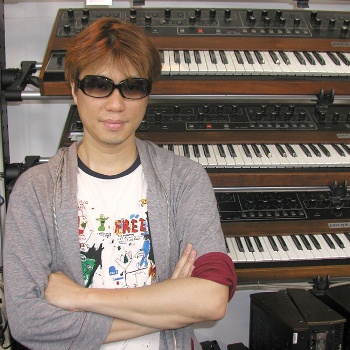
Trademark: Eccentric Genius, Man of a thousand styles, Zimmerian
Education: Tōkyō Geijutsu Daigaku
Most popular work: TTGL, Kenshin, Katanagatari
Inspiration & Style: Romantic Impressionism, Golden Age, Remote Control
Similar Western Composer: Hans Zimmer, Bernard Herrmann
LINK IN DESRIPTION (https://mega.nz/#!IiJAVbxD!noZRdB4OnikjQyh5EM5Fw71jpBa4arMNSozkP4I_LP0)
New releases:
The Girl Who Summons the Stars
Tokyo Studio Orchestra
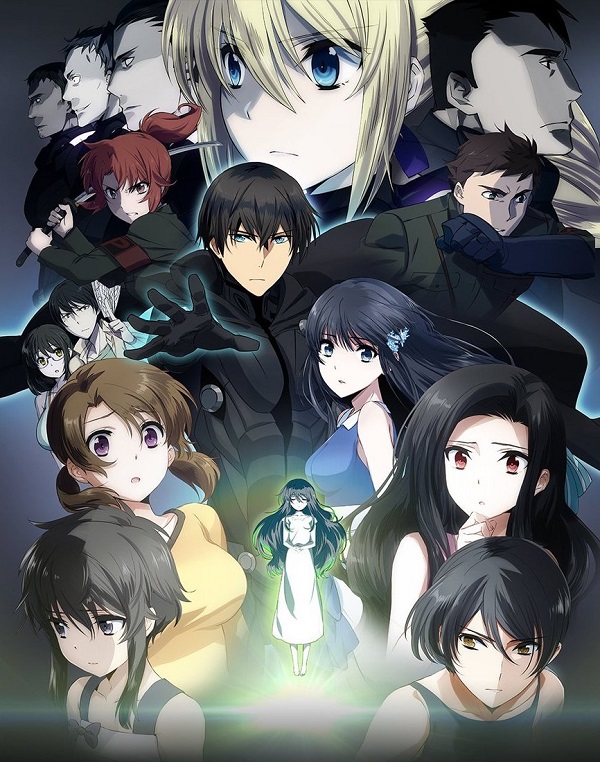
(https://mega.nz/#!u8IyTBTR!VmLQRcNsBXkoydQCoaQtkz2Sn0zQa31TQot7EHDX7Xw)
Sample (https://www.youtube.com/watch?v=EWHiObbYKwY)
BUNGOU STRAY DOGS
The Operatic Score
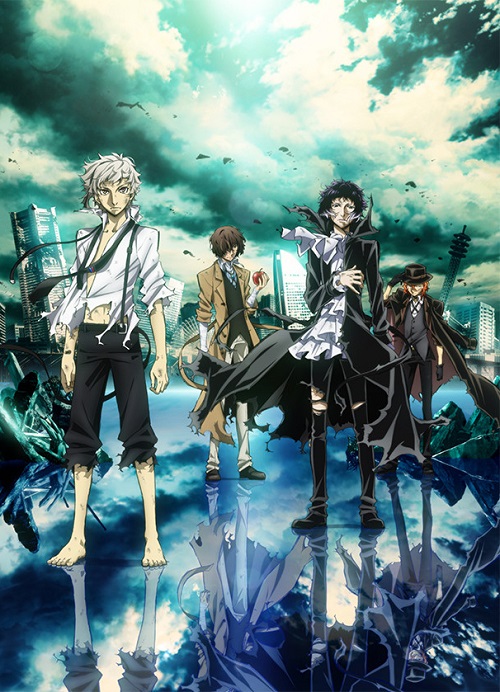
Download (https://mega.nz/#!eAhzmQgQ!lRaeNote2Qa-CJWGXvjq9Uuw3F910HNrW9Rb-lgW28k)
Sample (http://picosong.com/wCAJh)
Compilations:
Musical Portrait of Taku Iwasaki
From 1999 to 2009 and from 2010 to 2018
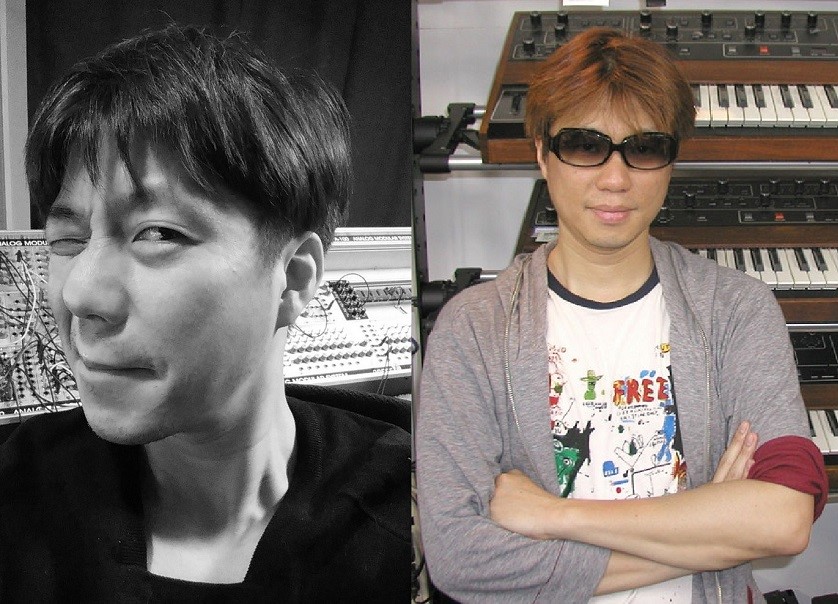
LINK IN DESCRIPTION (https://mega.nz/#!b5xWmBxT!qB1Y21VblKjuHxVC_Ak_VfyTkqMdqM3-cQGfoxDoYOs)
No other composer working today has demonstrated such great love for Bernhard Herrmann, with the skills to back it up. The only other case I can think of is Katsuro Tajima playing direct homage to Citizen Kane in Deadstorm Pirates. And this decade he is moving closer and closer to his idol:
Anime Taxi Driver (https://www.youtube.com/watch?v=6PfNmNXMhoQ)
Anime Psycho (http://picosong.com/wqs8x)
That he also consistently writes opera pieces that are so good they leave me with my jaw on the floor the first time through gives the entire anime industry an air of true artistic expression for composers that without his presence would be far more difficult to see. Many of his orchestal pieces, taken on its own, are among the best things Anime, or any media really, has to offer.
Throughout his career he throws us bone after bone what he could do if he would care approaching an orchestral score in a conventional way. Recently he seems to have mellowed out a bit on the idea of giving it a shot again, perhaps Dead Apple is yet another step in that direction
I also don't believe for a second that he didn't care for Mahouka or any anime score he ever scored for that matter. Regardless what he says on twitter, his street perfomance and the inherent quality in the music speak a clear language: Animoe (https://www.youtube.com/watch?v=bTmU27e36Uw) (he probably spent more time in the studio for this one piece than other composers do for an entire session)
But that's just one facette of his persona which has many more faces. That he can switch from street performer to sound designer to concert master in the blink of an eye sets him apart from pretty much all of his colleagues.
Taku Iwasaki

Taku Iwasaki is after Tanaka the second most prominent „Anime Composer”, perhaps to even more extremes than the original. His career has pretty much been anime-only and it seems to stay that way for years to come. He started as a song arranger for anime and now has become a distinctive and revered voice in the anime scoring world and is one of the few old warriors left (he’s almost 50 now), waving the flag for opera and Broadway song in media scoring. His music is as diverse as music can be. You get everything from 1920s galore and Italian opera to Zimmerian action and electronic dubstep. But if there's an area where he is pretty much the king of media composers now, it's in the romantic impressionism departement. His genius comes in the form of a mask with two faces: “The Composer” and “The Artist”. During the last decade he did mostly wear the mask of the artist while his earlier years were pretty much that of a traditional media composer. But recently he lets his old self emerge from time-to-time. “The Composer” can be divided into two phases: One more classically oriented and one on the side of Zimmer and RC. Iwasaki appears more confident and sincere in his talent for orchestral writing in the classical phase, often paying homage to the classical repertoire and the Golden Age of Hollywood. But Iwasaki is also very much a fan of Zimmer (mostly his early stuff). What I find ironic is that while Iwasaki pays homage to the style, he also puts the original inspiration to shame. It all comes down to the simple fact that Iwasaki lives and breathes with a classical mind (grounded on classical education) and Zimmer does not or at least never demonstrates it. I divided his “Artist” side by two Phases: The first one I call Rapera, his most recent one Dubera. It’s born out of his adoration for Rap, Dubstep and Opera. What characterizes both is at least one standout cue in every album, mostly an operatic piece or orchestral song among much electronics, rap or dubstep. In some cases the orchestral score is even build around this one piece, like Jojo with L’anima or Qualidea Code with Canary. Lets just say he wrote some true gems as Iwasaki “the artist”.
The Composer
I. The Classical Phase

Agito was the only time in his career working with a worldclass symphony orchestra and I would say he succeeded with flying colors in adapting his orchestral style for a symphonic ensemble. Some additional parts are done by a studio ensemble.
With Binchou-tan he again demonstrated the same kind of ingenuity with a chamber ensemble, delivering a unique and incredible heartwarming score. It’s as soothing as it is jolly with moments straight out of a ballet or romantic symphony.
In Black Butler Iwasaki lets his inner maestro loose, delivering hours of opera, marches, waltz, requiem and concerto. All in a quite sinister tone that would fit a Tim Burton movie like a glove.
Despite of having a bit Zimmerian action there’s A LOT of Herrmannesque beauty in Kataganagatri, a rather substantial amount of score with a nine minute concert piece and perhaps his most awesome song, “Peacock blue eyes”. A worthy successor of Kenshin with some unique instrumentation choices like Wood/Templeblocks. His “Gettouka” triumphs over similar efforts, like Kawai’s Ghost in the Shell for example.
Akame ga Kill is a modern action score done right, with unique use of epic choir and e-guitar. The action is definitely inspired by Dark Knight Rises. There’s a genius moment in “Formidable Enemy” that starts like a modern Blockbuster track but at the end evolves into a majestic SciFi moment. In the later half we have some absolutely sublime moments with some of the best orchestral pieces of Iwasaki’s career. I must also give him credit for actually getting me a little teary with ethnic vocals.
As of now there’s not much to justify Stray Dogs in this category BUT I put it on there in knowledge of things to come.
II. The Zimmerian Phase

His first major debut was with Rurouni Kenshin, and to this day one of his best works I would argue. It has beautiful romantic melodies crossed with early Zimmer style and a remarkable tragic tone. The second OVA in particular nails the tragic beauty aspect perfectly, with “Heart of the Sunrise” being one of my favorite Iwasaki pieces.
Uncharted Waters: Online is a potpourri of various musical styles and instruments. Iwasaki certainly nails the “period and place impressions” and gives us a hint just how good a traditional adventure score from him would sound like with “Battle Offense” and “Event: Delight”.
Oban Star Racers is basically a more refined Zimmer action score with some sublime Silver Age Hollywood moments. A terrible shame the unreleased music of the show will never see the light of day.
One of his most beautiful scores from this phase is Angel Heart, a beautiful noir score with Zimmerian action, but more importantly, dreamy sax pieces like they don’t make them no more and incredible romantic interplay of strings and piano.
Yakitate!! Japan is yet another potpourri, you have Backdraft and famous Band work from the 80s mixed with Golden Twenties galore and romantic symphony. Iwasaki is again showing his immense range and talent and even giving us a full-fleshed concert piece with “Japan, the World I create”.
We go into the glorious 60s spy movie territory with Read or Die. It’s basically what would happen if Zimmer and Serra scored 60s Bond and then some. The TV version is of course the main course, full of delicious Jazz and synthesizers galore. 009-1 is pretty much an encore of R.O.D and very much in the same vain.
Black Cat marked the beginning of his upcoming operatic trademark and orchestral song and very much functions as a transitional work were he slowly switched sides. Kekkaishi is another transitional work, but much more traditional. Many of his upcoming trademarks appear like the filtered trumpet, temple blocks and vocal effects. Bu there’s still a substantial amount of beautiful strings and woods.
Hakaima Sadamitsu is a much earlier work and perhaps his most unique one, going full spaghetti western. It will not be the last time he evokes Morricone.
The Artist
III. The Rapera Phase

Starting with his famous artist debut: Tengen Toppa Gurren Lagann. The usual romantic and jazzy Iwasaki is there, but we also have a pretty rap and electronic focus aspect. The action is no longer 100% Zimmerian and slowly becoming its own thing. It also has much stronger thematic consistency than usual, not to mention his first pioneer work in mixing orchestra & opera with rap.
Soul Eater continues the trend with a healthy dose experimental electronics and a little rap, but at its core has wonderful string and piano pieces, an insanely cute Disney song and a full-fleshed opera piece.
Persona: Trinity Soul is very much in the same territory with opera and rap, but has many callbacks to his earlier works like Angel Heart and beautiful song and piano tracks. Unfortunately not every track is real, a chunk of it is synth.
For C I prepared a special package: I divided the meat of JoJo and Jormungand to “C”, since I believe Iwasaki has some sort of continuity between these three scores, at least judging by the track titles and tone, while the dubstep and electronic orchestral pieces went to Gatchaman (I find it a perfect fit). C (The compilation) is not only a conglomeration but also culmination of Iwasaki’s current style. Beautiful orchestral song straight out of 1920 pared with modern RC action, various flavors of Jazz, impressionist concert work and glorious Italian Opera.
Noragami Aragoto is basically an arthouse score for some experimental film with some great string action, much more traditional than usual. A beautiful piano and flute piece is followed by a mini-concerto for flute before drifting into Hitchcock territory with one of the most incredible pieces of Iwasaki’s career.
God’s Notebook (Kamisama no Memou-choui) has electronics but is quite quaint compared to later works and much more gentle with beautiful song, some incredible noir pieces and the usual dose of romantic strings and piano. A beautiful breeze of fresh-air before the rather heavy albums are about to hit your ears.
IV. The Dubera Phase

Mahoka (The irregular at Magic High school) is more focused on the electronics with some experimental wackiness. Nonetheless this is Iwasaki we’re talking about so even the RC action has meat under it and switches from dubstep to a Holst-like rhythm in a matter of seconds. Speaking of Holst, an electronic dance track starting with a Jupiter-esque intro… oh Iwasaki-san. For the traditionalist there’s of course beautiful song, romantic piano and strings and the best variation of a “The End” moment Iwasaki has written.
The heart of QUALIDEA CODE is the beautiful “Good night, Canary” with many thematic variations in the score. It also shows Iwasaki’s consistent effort to refine the modern Hollywood action style and his use of electronics. There’s actually quite a chunk of score missing so final judgement is on hold until OST 2. But I very much like what I hear so far, especially stuff like “Agnus Dei”.
No matter its actual merits, Gatchaman Crowds is one of the most unique orchestral scores I’ve ever heard. To my knowledge it’s the only time so far that a composer seriously tried to incorporate electronics and dubstep in a “serious” composition (if you take Jojo’s dubstep as a part of it), mixing these elements with opera and modern action. The results are not for everyone’s ears I’m sure, but I find it fascinating. He really is a pioneer in this field. But apart from that there is something to love in Gatchaman, from the beautiful French song to the usual romantic strings. It’s also the first time he uses Vocaloid.
Finally, as a bonus, things come full circle with one of his earlier works, Now and Then, Here and There, which doesn't exactly move me but it has some good moments and is quite loved by many.
Composer Profile: Taku Iwasaki

Trademark: Eccentric Genius, Man of a thousand styles, Zimmerian
Education: Tōkyō Geijutsu Daigaku
Most popular work: TTGL, Kenshin, Katanagatari
Inspiration & Style: Romantic Impressionism, Golden Age, Remote Control
Similar Western Composer: Hans Zimmer, Bernard Herrmann
LINK IN DESRIPTION (https://mega.nz/#!IiJAVbxD!noZRdB4OnikjQyh5EM5Fw71jpBa4arMNSozkP4I_LP0)
New releases:
The Girl Who Summons the Stars
Tokyo Studio Orchestra

(https://mega.nz/#!u8IyTBTR!VmLQRcNsBXkoydQCoaQtkz2Sn0zQa31TQot7EHDX7Xw)
Sample (https://www.youtube.com/watch?v=EWHiObbYKwY)
BUNGOU STRAY DOGS
The Operatic Score

Download (https://mega.nz/#!eAhzmQgQ!lRaeNote2Qa-CJWGXvjq9Uuw3F910HNrW9Rb-lgW28k)
Sample (http://picosong.com/wCAJh)
Compilations:
Musical Portrait of Taku Iwasaki
From 1999 to 2009 and from 2010 to 2018

LINK IN DESCRIPTION (https://mega.nz/#!b5xWmBxT!qB1Y21VblKjuHxVC_Ak_VfyTkqMdqM3-cQGfoxDoYOs)
No other composer working today has demonstrated such great love for Bernhard Herrmann, with the skills to back it up. The only other case I can think of is Katsuro Tajima playing direct homage to Citizen Kane in Deadstorm Pirates. And this decade he is moving closer and closer to his idol:
Anime Taxi Driver (https://www.youtube.com/watch?v=6PfNmNXMhoQ)
Anime Psycho (http://picosong.com/wqs8x)
That he also consistently writes opera pieces that are so good they leave me with my jaw on the floor the first time through gives the entire anime industry an air of true artistic expression for composers that without his presence would be far more difficult to see. Many of his orchestal pieces, taken on its own, are among the best things Anime, or any media really, has to offer.
Throughout his career he throws us bone after bone what he could do if he would care approaching an orchestral score in a conventional way. Recently he seems to have mellowed out a bit on the idea of giving it a shot again, perhaps Dead Apple is yet another step in that direction
I also don't believe for a second that he didn't care for Mahouka or any anime score he ever scored for that matter. Regardless what he says on twitter, his street perfomance and the inherent quality in the music speak a clear language: Animoe (https://www.youtube.com/watch?v=bTmU27e36Uw) (he probably spent more time in the studio for this one piece than other composers do for an entire session)
But that's just one facette of his persona which has many more faces. That he can switch from street performer to sound designer to concert master in the blink of an eye sets him apart from pretty much all of his colleagues.